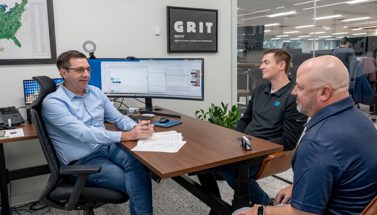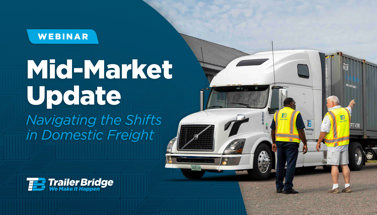
Double Brokering & Freight Fraud: How a Trusted Logistics Provider is Your Best Line of Defense
Freight fraud is at an all-time high. The Wallstreet Journal reported that double brokering alone claims $500 million – $700 million from carriers and brokers annually, with occurrences of the crime increasing 400% year over year from the end of 2021-2022.
While double brokering is the most prevalent fraud plaguing the freight industry, load board scams and forged paperwork, among others, are also siphoning money into criminal’s pockets.
If you think that freight fraud only impacts carriers and brokers, think again. Shippers are also vulnerable to the consequences. Lost product, interrupted business, damaged reputation, and more are possible if your load is intercepted by a criminal.
This climate has left many shippers questioning who they can trust to safely transport their cargo to its destination. While your instincts may tempt you to avoid working with a freight broker because you fear it will compromise your cargo’s security, we argue the opposite.
Having an experienced and trustworthy freight broker who is actively aware of the current threats to the industry is your best defense against freight fraud.
Below, we share why fraud is so widespread now, the types of fraud you need to be aware of most, and why a reliable freight broker is an asset to protect your cargo.
Common Types of Freight Fraud
When it comes to avoiding fraud, knowing what to look out for is key. These are four of the most common types of scams that shippers should be aware of.
Double Brokering
Double brokering has become such a problem for the logistics industry in recent months that the Transportation Intermediaries Association referred to it as a “crisis” at its April 2023 meeting.
What is double brokering? It is when a criminal posing as a carrier accepts a load from a load board, then re-posts the load where it is claimed by a legitimate carrier without knowledge or permission from the original broker.
Once the load is delivered, the legitimate carrier provides proof of delivery to the scammer who brokered the load. The scammer then forwards the proof of delivery to the original broker who provides payment for the service. The criminals then disappear before the broker realizes there is an issue.
In some cases, after the scammer has re-brokered the load, instead of completing the delivery, they will call the legitimate carrier and report a change in delivery destination. The carrier will then deliver the load to the new location where it is stolen without the carrier being any the wiser. This is commonly referred to as a fictitious pickup scam.
Double brokering poses a few significant problems:
- The broker and shipper have no visibility on their load because they don’t know which carrier it has been tendered to.
- Most insurers won’t cover cargo that is double brokered if the actual carrier isn’t able to be identified. So the shipment has no protection if it is lost, damaged, or stolen.
- The legitimate carrier who delivers the load may go unpaid or the broker will have to pay for the load twice – once to the scammer and once to the legitimate carrier when the scam is brought to light. If the legitimate carrier does not receive payment, they will turn to collections agencies or go after the customer to get paid.
Gone are the days when cargo thieves relied on traditional methods like stealing freight from truck stops, parking lots, warehouses, and distribution centers.
Load board scams are a form of identity theft that take advantage of a common digital industry tool (load boards) to target their victims. A load board is an online platform that connects carriers, shippers, and brokers – shippers and brokers can post loads that need to be moved and carriers can find loads to move.
Scammers will use load boards to impersonate a legitimate carrier, then pick up the cargo with no intention of delivering it to the receiver. Their goal is to claim and pick up as many loads as possible from a broker before they realize that fraud has occurred.
With more than 750,000 active motor carriers in the U.S., criminals behind load board scams take advantage of the vast number of players and fast paced nature of the spot market to trick inattentive shippers and brokers. This can be as simple as using an email address that appears identical to that of a legitimate carrier by adding, removing, or changing a single letter in the fake email address.
When they are successful, the first hint that something has gone wrong is when the broker discovers that the load has not been delivered when expected. Since the criminals falsify other carriers’ information, it is nearly impossible to track down the perpetrator or stolen load.
Shipper Impersonation Scams
Carriers aren’t the only ones vulnerable to impersonation. Bad players have also started impersonating shippers on load boards so they have full control of the scam from start to finish.
First, they will approach a broker to move a load using information stolen from a legitimate shipper and set up a line of credit. Then, when the broker posts their shipment to a load board, the same scammers will claim the load while posing as a legitimate carrier.
The illegitimate carrier will then demand quick pay from the brokers or threaten to not release the load. At this point, the brokers don’t realize that the shipper and carrier are one in the same, so they will provide the requested payment so their “customer’s cargo” isn’t held hostage.
And just like that, the brokerage is out the cost of a load that never existed in the first place.
Forged Paperwork
This is one of the simpler types of freight scams. In a forged paperwork scam, the carrier will falsify load documents so that they can get paid for a load that was never delivered, has damage, or other discrepancies like overages or shortages. This usually means providing false information or forging the receiver’s signature on the BOL so it looks like the load was successfully delivered.
Holiday Season Fraud Frenzy
Freight scams across the board increase dramatically during the holiday season (Christmas, Thanksgiving, Black Friday, New Years) as well as long weekends (4th of July, Memorial Day, Labor Day, etc.). The increased movement of goods, limited security at warehouses and distribution centers, and in some cases, reduced vigilance from drivers, makes it a prime time for criminals to strike. In 2022, the last three months alone accounted for more than 30% of the annual cargo thefts.
California, Texas, and Illinois are current freight fraud hotspots, with 51% of incidents reported in these areas in Q2 of 2023. The loads most targeted in these incidents are those containing alcohol, food and beverage, and electronics.
Beware of Unexpected Gifts
While the holiday season is a time of giving for many, cargo criminals take advantage of this generous spirit to further their agenda. Fraudsters will impersonate an acquaintance and send an email asking you to verify your information so they can send you a gift for the holidays. The requested information typically includes important identifying elements such as your phone number and address. Once the information is submitted, criminals use this data to carry out shipper or carrier impersonation scams.
In this climate of widespread freight fraud, it is good to have an ally with your best interests at heart. That is where a reliable freight broker comes in. Here are some of the ways that they can help you from becoming a scammer’s next victim.
They Only Ship with Trusted Carriers
One advantage of being in the freight business is that brokers will develop a docket of trusted carriers, ones they have worked with time and time again and have consistently delivered positive experiences.When using these carriers, brokers know that their customer’s cargo is in good hands.
When brokers do go to the spot market to move a load, they have an extensive set of tools to vet the carriers that offer their services. Here are a few of the ways a broker will verify a carrier’s legitimacy:
- Verify the DOT number provided
- Look up the company’s records on the Federal Motor Carrier Safety Administration (FMCSA) website, which all carriers are required to register with to operate
- Confirm the carrier’s insurance coverage
- Check that the contact name, address, and email domain is the same as what is registered with FMCSA
- Make sure that the carrier’s contact information hasn’t been changed recently, and reach out to the previous contact listed if it has
- Search the address of the company to verify that they have a physical location
Brokers also have additional tools they can use to verify a carrier such as Carrier411. This program allows users to search by carrier and provides FMCSA data such as carrier safety ratings, violations and crashes, DOT inspections, and FreightGuard reports.
FreightGuard reports allow shippers and brokers to report any negative carrier incidences such as freight theft, double brokering scams, unresolved claims, fraudulent activity, and more. The presence of these reports serve as a good indication if a carrier has previous incidents and should not be used.
While Carrier411 is the most common, new technology is constantly emerging to help brokers better pinpoint potential fraud before it happens. Brokers who keep up to date and invest in these tools can go a step further to protect their customers’ freight.
Some advanced tools give more in-depth carrier data by using a combination of public and private records to provide information like:
- Most recent truck count and trailer types held by a carrier:
While FMCSA relies on carriers to report this information when registering their business, there is no requirement that they update it regularly. New programs can cross-reference data like insurance and inspection records to give a more accurate representation of the number and types of equipment carriers hold.
This helps brokers identify potential fraud if carriers are offering to move loads with equipment they don’t own or if their number of loads moved outweighs the capacity of the trucks available.
- If the contact information provided is used by multiple carriers or brokers:
Sometimes criminals will use the same generic address across multiple impersonated carrier accounts. If this is the case, it is a good sign that the carrier may be involved in a scam.
- If multiple carriers or brokers within proximity of each other are using residential addresses:
While there may be a case for a legitimate carrier to use a residential address in their contact information, multiple carriers or brokers providing residential addresses for their businesses in the same geographic area is a red flag.
These thorough vetting procedures mean that brokers are more likely than not to book with reputable businesses. Remember, scammers rely on shippers and brokers not to be vigilant to carry out their crimes.
Relationships Go a Long Way to Protect from Fraud
The risk for fraud is higher when people are taken out of the equation and replaced with digital tools. While machines operate objective algorithms, the human ability to form relationships and trust instinctual feelings gives people an advantage.
When brokers value relationships, they make the effort to create connections with the people they work with, including their carriers and customers. These relationships bring a deeper knowledge of their contacts and foster a greater desire from all parties to provide good service and maintain positive rapport.
Most shipping scams happen when the load is in transit with the carrier, which makes it even more important to work with brokers who have a personal relationship with their carriers. When brokers work with carriers they personally trust, it is less likely for fraud to occur.
Carriers who have a rapport with the broker are more committed to maintaining the relationship by ensuring the security of their loads. As reported by Supply Chain Brain, “Carriers with a vested interest in maintaining a positive reputation will be more likely to take proactive measures to prevent cargo theft and double brokering freight fraud.”
When brokers do have to use a new carrier, efforts at establishing a human connection through phone, video, or in-person communication makes it much more difficult for fraud to occur. In fact, TIA has claimed that talking to the driver who is carrying your load is one of the best ways to detect scams.
Bottom line: the better a broker knows their customers and carriers, the more likely they are to prevent fraud before it happens.
They Are Mindful of Security Measures
With technology at the center of most freight scams, a reliable broker will have security protocol in place to help keep their online operations secure. One way to do this is to carefully choose the load boards that they use to book transportation for their clients’ cargo.
There are two main types of load boards – paid and free. Free load boards are open to use by anyone which makes them much more vulnerable to scams. Paid load boards usually require a subscription for their services and companies must provide information to be validated. Security is also more robust with these paid platforms, usually including features like 2 factor authentication and SSL encryption to prevent criminals from hacking into user accounts.
Another way freight brokerage businesses are boosting security is by educating their employees on fraud and what to look out for. Responsible brokers stay ahead of the curve by addressing the risks before they happen and training employees to do their due diligence even if it means taking more time to book a load.
Some brokerages even have departments dedicated to analyzing carrier relationships. These roles act as a second line of defense against scammers by performing additional carrier screening when a broker submits them to be onboarded to move a load.
Holidays and long weekends are another time you want a logistics expert on your side. During these times of increased fraud, they direct their carriers on additional security measures to make sure your goods don’t fall victim to cargo thieves. Some of these tactics include:
- Having the driver stay with the load during the whole trip, including break periods or keeping the load in a secured yard when not attended
- Verifying the security of any yard that the driver stops at by looking on Google maps to ensure it has a fence, gate, and cameras
- Directing drivers to parking areas with a security guard, indoor storage, or a wall that can block entrance to trailer doors
- Instructing the driver not to stop for at least 200 miles after pickup in case they are followed on long runs
When in Doubt, Trust the Experts
Like you trust banks to protect your money because of their financial expertise, shippers who use experienced and reputable brokers can expect the same security for their freight. And the world of freight fraud is ever evolving. So having a partner whose industry knowledge keeps them tuned in to these developments can greatly decrease your vulnerability.
Looking for a transportation partner you can trust? Ask us how we invest in our customer’s success – including protection from fraud.







